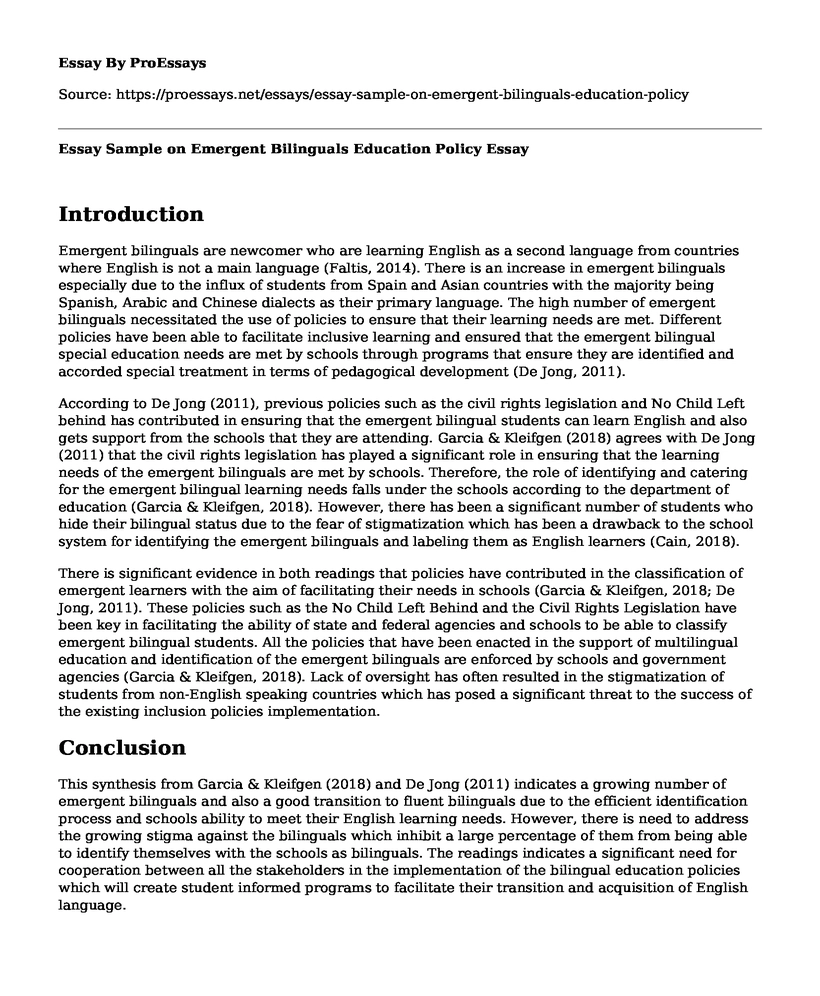Introduction
Emergent bilinguals are newcomer who are learning English as a second language from countries where English is not a main language (Faltis, 2014). There is an increase in emergent bilinguals especially due to the influx of students from Spain and Asian countries with the majority being Spanish, Arabic and Chinese dialects as their primary language. The high number of emergent bilinguals necessitated the use of policies to ensure that their learning needs are met. Different policies have been able to facilitate inclusive learning and ensured that the emergent bilingual special education needs are met by schools through programs that ensure they are identified and accorded special treatment in terms of pedagogical development (De Jong, 2011).
According to De Jong (2011), previous policies such as the civil rights legislation and No Child Left behind has contributed in ensuring that the emergent bilingual students can learn English and also gets support from the schools that they are attending. Garcia & Kleifgen (2018) agrees with De Jong (2011) that the civil rights legislation has played a significant role in ensuring that the learning needs of the emergent bilinguals are met by schools. Therefore, the role of identifying and catering for the emergent bilingual learning needs falls under the schools according to the department of education (Garcia & Kleifgen, 2018). However, there has been a significant number of students who hide their bilingual status due to the fear of stigmatization which has been a drawback to the school system for identifying the emergent bilinguals and labeling them as English learners (Cain, 2018).
There is significant evidence in both readings that policies have contributed in the classification of emergent learners with the aim of facilitating their needs in schools (Garcia & Kleifgen, 2018; De Jong, 2011). These policies such as the No Child Left Behind and the Civil Rights Legislation have been key in facilitating the ability of state and federal agencies and schools to be able to classify emergent bilingual students. All the policies that have been enacted in the support of multilingual education and identification of the emergent bilinguals are enforced by schools and government agencies (Garcia & Kleifgen, 2018). Lack of oversight has often resulted in the stigmatization of students from non-English speaking countries which has posed a significant threat to the success of the existing inclusion policies implementation.
Conclusion
This synthesis from Garcia & Kleifgen (2018) and De Jong (2011) indicates a growing number of emergent bilinguals and also a good transition to fluent bilinguals due to the efficient identification process and schools ability to meet their English learning needs. However, there is need to address the growing stigma against the bilinguals which inhibit a large percentage of them from being able to identify themselves with the schools as bilinguals. The readings indicates a significant need for cooperation between all the stakeholders in the implementation of the bilingual education policies which will create student informed programs to facilitate their transition and acquisition of English language.
References
Cain, A. A. (2018). Seven Tips for Teachers of Newcomer Emergent Bilingual Students. The Reading Teacher, 71(4), 485-490.
De Jong. E. J., (2011). Foundations for multilingualism in education: From principles to practice. Philadelphia: Caslon Pub.
Faltis, C. (2014). Language, language development and teaching English to emergent bilingual users: Challenging the common knowledge theory in teacher education & K-12 school settings. Association of Mexican American Educators Journal, 7(2).
Garcia, O., & Kleifgen, J. A. (2018). Educating emergent bilinguals: Policies, programs, and practices for English learners. New York Teachers College Press.
Cite this page
Essay Sample on Emergent Bilinguals Education Policy. (2022, Mar 15). Retrieved from https://proessays.net/essays/essay-sample-on-emergent-bilinguals-education-policy
If you are the original author of this essay and no longer wish to have it published on the ProEssays website, please click below to request its removal:
- Argumentative Essay Example: Should College Education Be Free or Not
- Effects of Trauma on Children Essay
- Speaking Situations Essay Example
- Essay Example on Setting Up Daycare: Benefits for Kids of All Ages
- Free Essay Sample on Day of the Lord: Catastrophe, Calamities, and Contest
- Diabetic Patient - Report Example
- My Dream Vacation - Free Essay Sample







